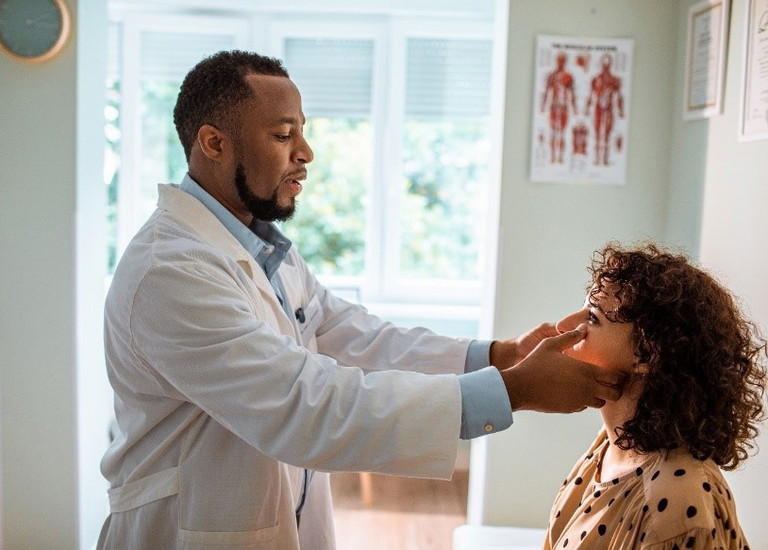Industry Insight
Improving the patient experience: insights from Uganda, the UK and the US
Improving patient experience is increasingly recognised as essential to enhancing healthcare quality, satisfaction and health outcomes across the globe. By understanding the unique challenges and opportunities in different regions, healthcare systems can develop more effective, patient-centred care models. What is the current state of patient experience in Uganda, the UK and the US – focusing on patient-centred care, physician perspectives and clinical research participation – and what are some future technological advancements that have the potential to transform healthcare?
By Lorna M Graham at Azurite Health

Patient-centred care: understanding patient values
Patient-centred care focuses on communication, empathy and respect, which are foundational to positive healthcare experiences. The way these elements are prioritised can vary based on cultural and regional contexts:
US: In the US, patient-centred care is a central component of improving healthcare outcomes, particularly for minority and low-income populations who often face barriers to quality care. Programmes like the Institute for Healthcare Improvement (IHI)’s ‘What Matters to You?’ campaign emphasise aligning care with patients’ specific needs and priorities.1 However, disparities persist, as many patients report that their care does not fully meet their personal expectations due to systemic complexities and time constraints.2
UK: The UK’s NHS emphasises universal healthcare access, which is valued by patients. However, recent pressures on the NHS, including long wait times and staff shortages, have strained patient-provider relationships, impacting the quality of patient-centred care.3 The NHS has responded by adopting co-production models that involve patients in designing services to meet their specific needs.3

Uganda: In Uganda, where healthcare resources are often limited, patients place a high value on respect and dignity in their interactions with providers. Despite resource constraints, community health workers play a critical role in delivering care and providing health education, ensuring that patient-centred care reaches even the most remote areas.4,5
Physician perspectives: delivering high-quality care
Physicians are at the forefront of delivering high quality care, and their perspectives shed light on the challenges and opportunities in improving patient experience:
US: Physicians in the US recognise the importance of building trust and establishing clear communication with patients, especially in underserved communities. However, many are constrained by time and the demands of complex healthcare systems. Programmes like Joy in Work, developed by the IHI, aim to reduce physician burnout, thereby improving patient engagement and the overall care experience.1,2
UK: UK physicians similarly emphasise empathy and communication, but many feel that systemic inefficiencies prevent them from spending adequate time with patients. Structural issues such as staffing shortages and long wait times hinder the ability to provide personalised care.3 NHS initiatives focused on integrating patient feedback into care planning aim to alleviate these challenges by improving patient-provider interactions.
Uganda: Ugandan physicians face significant resource limitations, including shortages of medical supplies and medicines. Despite these challenges, physicians remain focused on patient education and respectful communication. Community health workers support physicians in reaching underserved populations, particularly in rural areas, where healthcare access is limited.5,6
Improving clinical research participation
Clinical research is essential for advancing medical knowledge and improving healthcare outcomes. However, participation rates in clinical trials, particularly among underserved populations, remain low in all three regions:
US: In the US, historical mistrust of the medical research system, particularly among minority populations, and logistical barriers such as transportation, are major factors limiting participation in clinical trials.2 Researchers are working to build trust by improving transparency, simplifying consent processes, and offering support such as transportation and childcare.2
UK: The NHS has established a strong foundation of trust with the public, resulting in higher levels of participation in clinical trials. However, rural and low-income populations still face barriers to participation.
The expansion of telemedicine-based clinical trials during the COVID-19 pandemic has increased participation by allowing patients to take part remotely.3,7
Uganda: In Uganda, low awareness of clinical research and limited infrastructure are the primary barriers to participation. Researchers are focusing on community engagement and education to increase awareness and build trust in clinical trials.1,5
Future technological advancements and closing healthcare gaps
The integration of new technologies in healthcare presents transformative opportunities, but also carries the potential risk of deepening existing disparities between high-income countries (HICs) and low- to middle-income countries (LMICs). Ensuring equitable access to these innovations is crucial for narrowing healthcare gaps, enhancing patient experience and fostering trust in healthcare systems. Advancements in patient care must be implemented in ways that address the unique challenges faced by diverse populations, ensuring that technology bridges gaps rather than exacerbating them.8 In LMICs, projects in Uganda demonstrate the impact of integrating innovative measurement tools and fostering strategic partnerships in primary healthcare, underscoring the importance of adapting technologies to local needs. Furthermore, the World Health Organization (WHO) highlights the role of secure digital frameworks, such as blockchain, in protecting patient data and supporting trust across healthcare systems globally. These initiatives collectively emphasise the importance of focusing on equity as we move toward a more technologically advanced global healthcare landscape.8,9,10
Artificial intelligence (AI) and machine learning (ML)
AI is expected to revolutionise patient care by improving diagnostics, personalising treatment plans and increasing the efficiency of care. AI-powered tools such as chatbots can assist patients with routine inquiries and provide real-time health advice. In LMICs, AI can be tailored to address region-specific health concerns, allowing healthcare workers to offer high-quality care even in resource-poor settings.2 However, AI tools must be co-developed with local health systems to ensure they align with local needs and build trust among patients.
Telemedicine and remote monitoring
Telemedicine has been a game changer in expanding healthcare access during the COVID-19 pandemic, particularly in underserved communities. In LMICs, telemedicine can be scaled to reach remote populations, providing access to specialists without the need for in-person visits.6 Remote monitoring tools, such as wearable devices, allow patients to track their health metrics and share real-time data with providers, improving engagement and health outcomes.
Virtual reality (VR) and augmented reality(AR)
VR and AR technologies are being explored to enhance the patient experience during treatments, reduce pain and anxiety, and assist healthcare providers with real-time data overlays during procedures. In LMICs, these technologies can be adapted for patient education and surgical training, improving the quality of care without requiring sophisticated infrastructure.2
Blockchain for secure health data sharing
Blockchain offers a secure and transparent way to manage patient health data, giving patients control over their information. In LMICs, blockchain can ensure data sovereignty, allowing patients to decide how their data is used, while preventing exploitation. Blockchain can also improve the transparency of clinical trials by maintaining an immutable record of trial data, which builds trust in the research process.2,11
Genomics and personalised medicine
Genomics is paving the way for more personalised healthcare, allowing treatments to be tailored to an individual’s genetic makeup. However, for LMICs to benefit, investment in local genomic research and capacity-building is essential. Ensuring that genomic data from LMICs is used ethically, and that patients benefit from the research, will help close the healthcare gap.2
Robotic surgery and automation
Robotic surgery and automation have the potential to improve patient outcomes by enabling more precise, minimally invasive procedures. Automation can also support administrative tasks, freeing healthcare professionals to focus more on patient care. For LMICs, partnerships and technolog y transfer agreements can ensure that these innovations are available to local healthcare providers.1
Digital therapeutics
Digital therapeutics, which utilise software to treat and manage chronic conditions, are increasingly being recognised as a key innovation in healthcare. These tools empower patients to take an active role in managing diseases such as diabetes and anxiety, enhancing both engagement and satisfaction with their care.8 For LMICs, digital therapeutics offer an affordable solution to scaling chronic disease management where healthcare resources are often limited. Integrating these technologies into primary care is crucial for improving health outcomes globally, as emphasised in recent strategies for digital health. Moreover, the role of policy in shaping healthcare access, and ensuring that such advancements reach underserved populations, is critical in facilitating widespread adoption.2,8,9,10
Ensuring equity and building trust
To ensure that these technological advancements close rather than widen the healthcare gap, stakeholders must prioritise equitable access and ethical data sharing. Technology transfer agreements, co-development with local health systems and global partnerships are critical for ensuring that LMICs benefit from technological innovations. By involving local researchers, clinicians and policymakers in the development and implementation of these tools, healthcare systems can build long-term trust with underserved populations.2 Global organisations like the WHO can establish standards that promote healthcare equity, ensuring that all countries benefit from advances in healthcare technology.6,10
Conclusion
As healthcare systems evolve, emerging technologies such as AI, telemedicine, blockchain and genomics offer unprecedented opportunities to enhance the patient experience across diverse regions, including Uganda, the UK and the US. However, for these innovations to truly benefit global healthcare, the focus must remain on ensuring equitable access and building trust, particularly in LMICs. Addressing these disparities requires a concerted effort involving ethical data sharing, global collaboration and investment in local healthcare infrastructures. By prioritising equitable integration and fostering transparency, healthcare systems worldwide can harness these technologies to close gaps in care, improve outcomes, and create a more inclusive and patient-centred global healthcare landscape.
These advancements will not only revolutionise patient experience but will also lay the foundation for a future where quality care is accessible to all, irrespective of geographic or socio-economic boundaries.
References
- Visit: ihi.org/insights/putting-whatmatters-you-practice-improve-patientexperience-and-equity
- Visit: ama-assn.org/delivering-care/healthequity/how-us-policy-can-shape-yourpatients-health-outcomes
- Visit: england.nhs.uk/wp-content/uploads/2022/10/B1632-sharedcommitment-for-those-working-in-healthand-care-oct2022.pdf
- Visit: sites.brown.edu/publichealthjournal/2024/03/29/beyond-borders-a-glimpse-into-ugandashealthcare-challenges-and-solutions
- Visit: academic.oup.com/ijcoms/article/2/1/lyac005/6580074
- Visit: thinkmd.org/project/addressinghealthcare-challenges-in-uganda/
- Visit: commonwealthfund.org/publications/issue-briefs/2024/aug/community-healthcenters-meeting-primary-care-needs-2024FQHC-survey
- Visit: info.pressganey.com/press-ganeyblog-healthcare-experience-insights/patient-experience-in-2024-bridging-thegap
- Visit: ariadnelabs.org/resources/articles/advancing-primary-health-care-in-ugandathrough-innovative-measurement-andef fective-partnership/
- Visit: who.int/publications/i/item/9789240020924
- Visit: ncbi.nlm.nih.gov/pmc/articles/PMC7530694/
First published in International Clinical Trials Autumn 2024.

Lorna M Graham BSc Hons MSc is an experienced pharmaceutical and healthcare consultant with over 20 years in the pharmaceutical and contract research organisation (CRO) sectors. Her expertise encompasses project management, clinical research and business development, with a particular focus on oncology, cardiovascular diseases, rare diseases and women’s health. As the co-founder and independent consultant at Azurite Health, Lorna continues to lead innovative global healthcare initiatives. She holds a BSc Hons in Biomedical Science with Human Biology and an MSc in Economic Evaluation in Healthcare from City University of London, UK, and is a contributor to key industry publications and conferences.